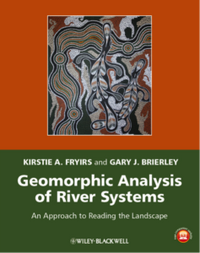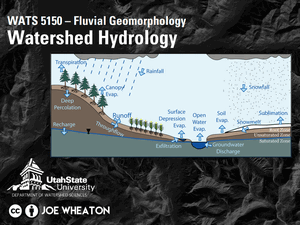Module 4: Catchment Hydrology
Background
Why we’re covering it
The amount of discharge (flow) thorugh your riverscape is the end result of a suite of hydrologic processes that make up the water cycle. In short, even though flow in rivers constitututes less than 0.0001% of water on earth, this is the engine for shaping riverscapes and driving geomorphic processes. A brief overview of hydrology is reviewed.
Learning Outcomes
- Differentiate influence of external controls (e.g., climate and catchment) vs. local controls on form and process.
- Understand how hydrologic processes, give rise to hydraulic processes, which in local riverscapes.
Resources
Slides & Handouts
We cover Module 4 and Chapter 4 in about 1.5 hours of lecture below. A few topics we will discuss in class.
Entire Lecture Playlist
1 hour 30 minutesCorresponding Chapter in Course Text
 From:
Fryirs KA, Brierley GA. 2013. Geomorphic Analysis of River Systems: An Approach to Reading the Landscape, First Edition. Blackwell Publishing Ltd.: Chichester, U.K.
From:
Fryirs KA, Brierley GA. 2013. Geomorphic Analysis of River Systems: An Approach to Reading the Landscape, First Edition. Blackwell Publishing Ltd.: Chichester, U.K.
This module focus on: CHAPTER FOUR: Catchment hydrology
Relevant or Cited Literature
Follow up selected readings suggested by Fryris and Brierley (2013) are provided for every chapter in page 328-334 of the text book.
Other Resources
Follow up Classes at USU
Ecohydrology - The Story of Fog in Redowoods
Hydrology of Redwoods
In California's Coast Ranges plants not only use water directly from rainstorms, but also harvest the thick fog that blankets these mountains.
